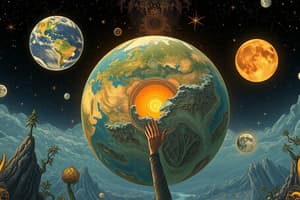Podcast
Questions and Answers
What does the Greek word 'geo' refer to in the context of the geosphere?
What does the Greek word 'geo' refer to in the context of the geosphere?
- Sky
- Water
- Life
- Ground (correct)
Which layer of the atmosphere is closest to the Earth's surface?
Which layer of the atmosphere is closest to the Earth's surface?
- Thermosphere
- Exosphere
- Troposphere (correct)
- Stratosphere
What percentage of Earth's water is comprised of saltwater?
What percentage of Earth's water is comprised of saltwater?
- 85%
- 97.5% (correct)
- 75%
- 90%
Which subsystem of Earth includes all living organisms?
Which subsystem of Earth includes all living organisms?
Which part of the geosphere is liquid?
Which part of the geosphere is liquid?
How many distinct layers does the atmosphere have?
How many distinct layers does the atmosphere have?
What distinguishes the upper and lower layers of the mantle in the geosphere?
What distinguishes the upper and lower layers of the mantle in the geosphere?
What is the primary interaction between Earth's subsystems responsible for various processes?
What is the primary interaction between Earth's subsystems responsible for various processes?
What is the process called that describes the movement of water from the ocean to the atmosphere and back to the ocean?
What is the process called that describes the movement of water from the ocean to the atmosphere and back to the ocean?
Which of the following subsystems does NOT directly interact within the hydrologic cycle?
Which of the following subsystems does NOT directly interact within the hydrologic cycle?
Which biogeochemical process allows plants to take in carbon dioxide and water?
Which biogeochemical process allows plants to take in carbon dioxide and water?
Which of the following elements is involved in the nitrogen cycle?
Which of the following elements is involved in the nitrogen cycle?
What is the key concept demonstrated by the movement of matter such as carbon dioxide and water in Earth’s cycles?
What is the key concept demonstrated by the movement of matter such as carbon dioxide and water in Earth’s cycles?
What are carbon-based materials primarily produced during photosynthesis?
What are carbon-based materials primarily produced during photosynthesis?
Which cycle is mainly responsible for the recycling of elements necessary for life on Earth?
Which cycle is mainly responsible for the recycling of elements necessary for life on Earth?
In the context of Earth’s subsystems, which of the following best describes the interaction occurring during the biogeochemical cycles?
In the context of Earth’s subsystems, which of the following best describes the interaction occurring during the biogeochemical cycles?
Which gas is considered the most significant greenhouse gas that affects atmospheric conditions?
Which gas is considered the most significant greenhouse gas that affects atmospheric conditions?
What role do oceans play in climate regulation?
What role do oceans play in climate regulation?
How does soil moisture impact surface temperature?
How does soil moisture impact surface temperature?
Which factor significantly influences the wind patterns on land?
Which factor significantly influences the wind patterns on land?
Which process in the biosphere can alter the climate system?
Which process in the biosphere can alter the climate system?
What is the main way soil and vegetation affect climate?
What is the main way soil and vegetation affect climate?
Which of the following spheres is primarily responsible for storing and releasing energy?
Which of the following spheres is primarily responsible for storing and releasing energy?
Which of the following greenhouse gases is least likely to influence climate based on its abundance?
Which of the following greenhouse gases is least likely to influence climate based on its abundance?
What is the primary focus of the 'Gaia Hypothesis' as suggested by the University of Michigan’s Global Change Courses?
What is the primary focus of the 'Gaia Hypothesis' as suggested by the University of Michigan’s Global Change Courses?
Which organization provides information regarding the different layers of Earth's atmosphere?
Which organization provides information regarding the different layers of Earth's atmosphere?
What topic does the resource from Utah State University primarily address?
What topic does the resource from Utah State University primarily address?
Which publication discusses the evolution of Earth?
Which publication discusses the evolution of Earth?
What is the main subject of the resource found at the United States Geological Survey website?
What is the main subject of the resource found at the United States Geological Survey website?
What is the first step of the hydrologic cycle?
What is the first step of the hydrologic cycle?
During which step of the nitrogen cycle is atmospheric nitrogen converted to a usable form?
During which step of the nitrogen cycle is atmospheric nitrogen converted to a usable form?
Which process releases water from clouds during the hydrologic cycle?
Which process releases water from clouds during the hydrologic cycle?
What do plants release during photosynthesis in the carbon and oxygen cycle?
What do plants release during photosynthesis in the carbon and oxygen cycle?
What is the process called when nitrogen is returned to the atmosphere?
What is the process called when nitrogen is returned to the atmosphere?
Which components are involved in the transfer of elements within the biogeochemical cycles?
Which components are involved in the transfer of elements within the biogeochemical cycles?
What is produced during ammonification in the nitrogen cycle?
What is produced during ammonification in the nitrogen cycle?
What role does lightning play in the nitrogen cycle?
What role does lightning play in the nitrogen cycle?
Flashcards
What are Earth's four major subsystems?
What are Earth's four major subsystems?
The Earth is a giant, complex system made of four major parts that interact with each other.
What is the atmosphere?
What is the atmosphere?
The blanket of gases surrounding the Earth, protecting us from harmful radiation and creating weather patterns.
What is the geosphere?
What is the geosphere?
The solid, rocky part of Earth, containing the crust, mantle, and core.
What is the hydrosphere?
What is the hydrosphere?
Signup and view all the flashcards
What is the biosphere?
What is the biosphere?
Signup and view all the flashcards
What is the troposphere?
What is the troposphere?
Signup and view all the flashcards
What is the stratosphere?
What is the stratosphere?
Signup and view all the flashcards
What is the mesosphere?
What is the mesosphere?
Signup and view all the flashcards
What is the thermosphere?
What is the thermosphere?
Signup and view all the flashcards
What is the exosphere?
What is the exosphere?
Signup and view all the flashcards
What is the Earth's crust?
What is the Earth's crust?
Signup and view all the flashcards
What is the Earth's mantle?
What is the Earth's mantle?
Signup and view all the flashcards
What is the Earth's core?
What is the Earth's core?
Signup and view all the flashcards
What is the hydrologic cycle?
What is the hydrologic cycle?
Signup and view all the flashcards
What is evapotranspiration?
What is evapotranspiration?
Signup and view all the flashcards
What is condensation?
What is condensation?
Signup and view all the flashcards
What is precipitation?
What is precipitation?
Signup and view all the flashcards
What is nitrogen fixation?
What is nitrogen fixation?
Signup and view all the flashcards
What is ammonification?
What is ammonification?
Signup and view all the flashcards
What is nitrification?
What is nitrification?
Signup and view all the flashcards
What is denitrification?
What is denitrification?
Signup and view all the flashcards
What is photosynthesis?
What is photosynthesis?
Signup and view all the flashcards
What is respiration?
What is respiration?
Signup and view all the flashcards
How do Earth's four spheres interact?
How do Earth's four spheres interact?
Signup and view all the flashcards
What are biogeochemical cycles?
What are biogeochemical cycles?
Signup and view all the flashcards
What are some influences on climate?
What are some influences on climate?
Signup and view all the flashcards
How do atmospheric conditions influence climate?
How do atmospheric conditions influence climate?
Signup and view all the flashcards
How does the hydrosphere influence climate?
How does the hydrosphere influence climate?
Signup and view all the flashcards
How does topography influence climate?
How does topography influence climate?
Signup and view all the flashcards
How does the biosphere influence climate?
How does the biosphere influence climate?
Signup and view all the flashcards
Study Notes
Spheres of Earth
- The term "sphere" originates from the Greek word "sphaira," meaning globe or ball.
- Earth consists of four major subsystems: atmosphere, geosphere, hydrosphere, and biosphere.
- Interactions among these subsystems facilitate various geological and ecological processes.
Atmosphere
- Composed of all gases surrounding Earth, divided into five layers:
- Troposphere
- Stratosphere
- Mesosphere
- Thermosphere
- Exosphere
- Vital for weather patterns and climate regulation.
Geosphere
- Derived from the Greek word "geo," meaning ground.
- Comprises three main layers:
- Crust: the solid outer layer.
- Mantle: the middle layer, with a more fluid upper layer.
- Core: innermost layer, with a liquid outer core and solid inner core.
Hydrosphere
- Encompasses all of Earth's water: water vapor, liquid, and ice.
- 97.5% of Earth's water is saltwater, while only 2.5% is freshwater.
- Plays a crucial role in climate regulation by storing and transporting energy.
Biosphere
- Includes all living organisms on Earth and their interactions.
- Encompasses diverse life forms including microorganisms, crucial for maintaining ecological balance.
Climate Influences
- Several factors significantly affect climate, including the four spheres:
- Atmospheric Conditions: Influenced by greenhouse gases like water vapor.
- Hydrosphere: Ocean currents store and release large amounts of energy, regulating climate.
- Topography: Surface features affect wind patterns and storm behavior.
- Photosynthesis and Respiration: Essential processes in the biosphere that impact carbon dioxide and oxygen levels.
Biogeochemical Cycles
- These cycles describe the transfer of matter and energy through Earth's systems:
Hydrologic Cycle
- Movement of water from oceans to the atmosphere, land, and back:
- Evapotranspiration: Liquid water transforms to gas.
- Condensation: Formation of clouds.
- Precipitation: Release of water from clouds back to Earth.
Nitrogen Cycle
- Involves the conversion and movement of nitrogen through various forms:
- Nitrogen Fixation: Conversion of atmospheric nitrogen to usable forms.
- Ammonification: Release of ammonia during decomposition.
- Nitrification: Conversion of ammonia to nitrates/nitrites.
- Denitrification: Return to atmospheric nitrogen.
Carbon and Oxygen Cycle
- Integrates processes like photosynthesis and respiration:
- Plants absorb carbon dioxide and release oxygen, while animals do the opposite.
Key Takeaways
- The interconnectedness of the four spheres allows for complex biogeochemical processes.
- Understanding these cycles is crucial for recognizing how matter and energy flow through Earth’s subsystems.
Studying That Suits You
Use AI to generate personalized quizzes and flashcards to suit your learning preferences.




